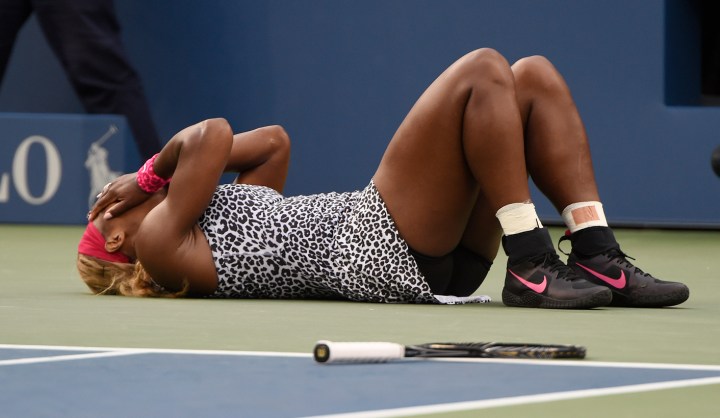Sport
Keen, Lean, Seren(a): Williams serves up more of the good stuff

Serena Williams has time and again smashed preconceived notions about what female heroes and celebrities should be. In an age where women continue to grapple with body image and strong role models are desperately needed, Williams is, quite simply, an ace. By ANTOINETTE MULLER.
There are few sights as intimidating as Serena Williams on a tennis court. As an athlete, she is close to embodying perfection. On Sunday night, she cruised past Caroline Wozniacki, beating her 6-3, 6-3 to claim her sixth US Open title. It put her level with Chris Evert and Martina Navratilova for 18 Grand Slams, and she is only behind Steffi Graf as a major winner in the Open Era.
While the tennis on show was poor – faults and double faults and the inability of Wozniacki to hold her serve – Williams reminded everyone that she is a phenomenal powerhouse.
At some point in your life, you’ve most likely been told that women have to behave a certain way. Whether this information has been imparted directly or covertly, you’ve been exposed to the suggestion that women should be refined and demure, quiet and subtle, and to some degree embody passiveness. Naturally, this causes massive challenges for women who want to get ahead in sport – they have to defy stereotypes at every turn and battle, it seems, their very identity. While much has been done to eradicate these expectations, Williams herself has still had to fight some of these stereotypes – yet she has excelled, despite not being “picture perfect”.
She does not fit the mould, no; instead, she has trampled on it and created a new one. Strong, bold, aggressive and passionate, Williams is everything that she has been told – as a woman and a black athlete – she cannot be. Since turning pro back in 1995, she has had an empowering career. She has the record feat of having won Slams in her teens, twenties and in her thirties, and whenever there have been hints that she might be out for the count, she has come back and done something special.
While her constant presence on the tennis courts has a massive impact, she has gone far beyond those efforts. Her work off the field is well documented. She has opened two secondary schools in Africa – one in Senegal and one in Kenya – and for the 32-year-old, these off-field expeditions are far more important to her than her titles.
“I feel that every time I win, I’m helping people because I came from nothing,” Williams said after winning the Australian Open in 2010.
“I want people like that to know they can build a life, whether it be through sports, through education, or another channel. If they can see it, then they know they can do it, too.
“I can win Grand Slams but honestly, 30 years from now, people aren’t going to remember who won the Australian Open in 2010. But when I cut that ribbon (at the Senegal school) I was teary eyed because I never thought I would have that opportunity. And I got that opportunity from winning all those Grand Slams,” she added.
While she downplays the importance of her tennis legacy, it certainly matters too. The 2013 US Open main draw had four black American women under 21 competing. Sloane Stephens, Madison Keys, Sachia Vickery and Victoria Duval are all women who grew up watching Williams play. When Vickery was just five years old, she said that she would be the next Serena, and her mother headed off to buy her a racket from the dollar store. The next day, she broke her grandmother’s bedroom window trying to play like her hero, Williams.
She is 19 now, and while she has not won any major titles, it is Williams’ strength and power that inspired her to be comfortable with her body. When Vickery made her debut, Williams was watching courtside. Vickery got a case of the chips and lost 5-0 to Martina Hingis. Afterwards, Williams walked up to Vickery and gave her a hug, a simple gesture that will live on in Vickery’s memory far longer than the loss.
“I don’t worry about leaving a tennis legacy or anything. I just kind of do what I do. My whole thing is about what I can do off the court. I think it’s cool that I can win Grand Slams, but I think it’s better if I can help others,” Williams said after the Australian Open in 2010. What she does not realise is that through her tennis, she is helping women in more ways than one.
From a body image point of view, she is a leader for the fit and strong. The impact of having role models like these in modern society cannot be underestimated. The issue of female body image dominates the headlines, but with women like Williams in the spotlight, that image will at least be challenged. During the 2012 London Olympic Games, the BBC developed an online app enabling each user to identify their closest athletic match. It was a small step in encouraging women to be positive about their physique and it made the question of “am I the right shape?” look marginally more silly. Williams – and many other female athletes – are the epitome of strength and health. If they are making those at the top of celebrity culture feel uncomfortable with the way they look, that can only be a good thing. To break down the pervasive association between success and the ever-present size zero, women like Williams are important.
But it’s not been so simple to get there. Aside from having to deal with challenging the expectations of what femininity, beauty and success should be, Williams has also had to contend with a tough childhood. Having grown up in Compton, Southern California, where the median household income is $43,311 – 30 percent less than the state’s average – and violence is rife, she has overcome more than many other pros have had to. Her half-sister, Yetunde Price, was killed in a gang shooting in 2003. Yet she has never completely gone off the rails, even faced with such adversity.
She is certainly not without her faults. From outbursts at line-judges to poorly chosen words relating to the Steubenville rape case, she has had to contend with controversy, but she has always bounced back, and while character flaws should not be dismissed, they certainly do not define her. In fact, they prove that she is human, and can serve as inspiration for how to bounce back from failure.
While she is at an age where athletes are expected to start winding down, she has hit form at the perfect time this year. Her resilience on and off the court is a fantastic inspiration for many young women across the world, and she is well on her way to becoming the greatest tennis star of all time, in more ways than one. DM
Photo: Serena Williams of the US reacts after defeating Caroline Wozniacki of Denmark to win the women’s final match on the fourteenth day of the 2014 US Open Tennis Championship at the USTA National Tennis Center in Flushing Meadows, New York, USA, 07 September 2014. EPA/JOHN G. MABANGLO



















 Become an Insider
Become an Insider